Dashnor Kaloçi
Memorie.al publishes the unknown story of the fierce conflict that took place in the press of the Zog Monarchy in the mid-30s between the director of the newspaper “Vatra”, Timo Dilo (originally from Labova e Zhapa of Gjirokastra) and Abdurrahman Dibra, Member of Parliament and former Minister of Education, Culture and Finance, who at that time was also the director of the newspaper “Besa” published in Tirana. All the mutual accusations between the two publishers which had a great echo at that time in the political and intellectual circles, as well as the statement of the well-known publicist, Nebil Çika, who sided with his colleague, Dilo …!
During the years of the Zog Monarchy (1925-1939) the ruling regime of that time, had implemented and adopted a very modern legislation for the time, which left nothing lacking even the legislation of the most advanced Western states that had a consolidated democracy for decades. One of those laws of the Zog Monarchy was that of the press, which functioned best by sanctioning and guaranteeing the freedom of expression for any Albanian or foreign citizen, which existed not only on paper (in the Constitution of the Kingdom), but also in fact in everyday life. Given that complete freedom of the press, (the law made an exception only for the Royal family, which could not be attacked in the press), in the newspapers of that time there were many articles, petitions, and various articles that directly attacked the highest officials of the state, from the Prime Minister, the Speaker of Parliament, MPs, mayors, to the simplest employees of the local administration of the Kingdom. In those writings, senior state officials or ministers and deputies were openly accused of taking bribes, illegal profits, and various abuses they made with state finances or with the positions they held and had once held during the years of the Monarchy. Zogut. Most of these articles, which directly attacked senior officials, were made mainly by journalists and newspaper publishers, who were in the current and daily contacts with people of political and public life. One of those fierce debates that took place in the press of those years was that between the director of the newspaper “Vatra”, Timo Dilo (originally from Labova of Gjirokastra), and the director of the newspaper “Besa”, Abdurrahman Dibra, who during During the period of the Zog Monarchy, he was also a Member of Parliament and a member of several ministerial cabinets, holding portfolios of Finance, Education and Culture. Without pretending to take the side of one or the other in that debate that took place at that time between them, but with the sole purpose of having a more complete idea of the freedom of the press and the degree of emancipation that existed in Albania in those years, a part of the controversial one, Memorie.al is publishing it in full and without changing anything, considering it as a reality of the Albanian society of that time.
Continues from the last number
Reaction
Press comments on Abdurrahman Dibra’s controversy with Timo Dilon:
Publicist Nebil Cika: Minister Dibra abused finances
The aggravated conflict between the director of the newspaper “Besa”, Timo Dilo and the director of the newspaper “Vatra”, Abdurrahman Dibra, (at that time he was also a member of the Albanian Parliament and at the same time held several ministerial posts in various government cabinets of the Zopg Monarchy ), which lasted for several months with fierce debates in the press, had a lot of reactions and a great echo both in the political circles of that time and in the press of those years.
One of those well-known publicists and publishers of that period who spoke openly about the conflict between the two well-known publishers was Nebil Çika, who naturally sided with his colleague, Timo Dilo, and attacked the former Minister of Finance, Abdurrahman Dibra, accusing him of illegal profits in the department he once headed.
In the reaction of the publicist Nebil Çika, which was also published in full by the newspaper “Vatra”, it was said: “Mr. Nebil Çika commenting on the impression he made on the general public of the recent controversy between the newspaper” Besa “and” Vatra “, under the title “Bravo, Dilo”, publishes in yesterday’s newspaper the article that we are publishing here below:
The opinion decided! Undoubtedly, “Besa” appeared with its most realistic color in the attack it made on Timo Dilo a few days ago. On the contrary, “el gant” and senior Timo Dilo appeared in his response. And above all sober, objective and realistic.
He denied one by one the accusations that exposed the slanders, and in this way, he turned back all the attacks of “Besa”. In the fierce duel, “Besa” was injured and Timo Dilua triumphed in public opinion, waiting for the white page to appear under the shelter of Justice. His letter to the responsible director of “Besa” is a dramatic irony for this apashe newspaper! The sedra with which Dilua responded to the barbaric attack was the most shocking slap that could be given to “Besa” in such a case.
Dilua is not terribly bloodthirsty in this war, he attacks without attacking, he kills without hitting: -He says to “Besa” and finally gives him a high lesson: work is not a shame. If I was a servant and polished, it shows that I lived by my sweat. What is shameful is to become rich and build palaces without working.
On the other hand, Dilos’s revelations on the general treasury payments made under the control of Mr. Dibra, when he was Minister of Finance, are quite interesting. Shows that Mr. Dibra used the power in his hands a lot.
Let’s see what answer I will give to this “Besa”, an organ of beautiful society! That we will have a question for Mr. A. Dibra, tomorrow or the day after tomorrow. And the public will decide! N.Ç.
Press and Government
The Council of Ministers is very active these days, in terms of publishing notebooks and magazines. “A.B.C” closed it and sent its director to the political trial, where he was detained. The other magazine “Rilindja”, after sending it to the ordinary court, closed it the day before yesterday. Circulars after circulars are sent to newspapers to refrain from personal controversy, slander, swearing, and from reports that alarm the public, and the latest circular also sets out the guidelines that newspapers should have.
“The press must be objective and always lean towards an optimistic spirit for national affairs, in order to keep its mission high,” the latest circular concludes. And the people, who have heard from the Prime Minister that “where there is no freedom, there are conspiracies”, even that only those who have Anatolian mourning, can remember that freedom is a bad thing, apart from other solemn statements of the Prime Minister, that the faults of the press will be tried only by the courts – the people said, rightly ask: why this change towards the freedom of the press?
Let us explain: We do not disclose whether or not the articles in the two magazines that were closed were punishable by death. We just want to say here: when the government found these articles dangerous and to cut the momentum of that campaign, found it reasonable for their directors to be punished, I do not send them to court, but punish them by decision of the Council of Ministers, as was done with previous governments?
What was the need to send the director of the magazine “A.B.C” to the political trial, until we have in force the relevant press law and the ordinary courts function?! “Vatra” was the first and only one in the beginning to baptize today’s liberal cabinet, and this title was liked and confirmed by the Prime Minister himself in a motion that took place in Parliament.
“Vatra”, I consider this government as a savior and I fight terribly, only to convince the skeptical people and to strengthen the opposite propaganda of the besaghin. And we convinced him. So “Vatra” has the right to deal more than any other newspaper with the current position of the Government, towards the press publications.
“Arbënia” said from the beginning that this government is “transitory” and “Besa” called it “unfortunate”. Only “Vatra” appeared without reservation. Only “Vatra” withstood skepticism, from the first day that the Government of Mehdi Frashëri came into power. “Vatra” should not be denied the right to forgive the change of the Government’s tactics towards the Freedom of the Press.
Why not say it? While the Council of Ministers has a direct hand on newspapers or magazines, it cannot be claimed that freedom of the press is respected. It would be respected only when the alleged guilt of the press was shown and punished by the courts. The criminal code and the law of the press have foreseen all the faults of the press and are provisions that protect both state and private interests.
Just as Albanians and patriots are ministers, so patriots and Albanians are judges. Why, then, should we not be judged by them, and even more so than the Government itself has solemnly promised? It is Anatolian who thinks that freedom is a bad thing, the Prime Minister told us in an interview. Savant words! We enter the sixth month of the day we enjoy and have benefited from freedom of the press.
What evil have we seen? Nothing. We have seen, on the contrary, valuable benefits. We were given the opportunity to put each person in his place, and when each person takes the place he deserves, only the collectivity sees better. You will probably say, together with the collaborator of “Arbnia” A.D., that the press cannot fall into the hands of cats. Wrong. Se vete z. D. bragging in an article to the publishers of “A.B.C.” magazine, after singing on the first wall, that number, that is, causing the director to be sent to the political trial and the magazine closed.
And the mistake lies here: if an item, is malicious, the sword of justice is sharp enough to fall on the head of the guilty and the guilt is not repeated. The issue of course changes, if the boasting is done only when the mejtim of the article coincides with the one who boasts. But they do not call this objectivity, they do not call it an impartial trial, but they say something else.
So, they say, “You are good as long as I like you.” The government, of course, is in a position to impose its mourning. But we who have fought so hard for the freedom of the press, as long as we have been allowed such a fight, cannot tacitly accept that the guilt of the press should be condemned by the Council of Ministers, and even more so when it has appeared so solemnly from the government, preserving freedom!
Exile of three newspaper publishers who attacked the government!
The internment of three people in different parts of Albania became almost officially known. In Porto-Palermo, it is true that they were not sent, but the fact is that they were interned. “Arbnia”, dealing with this new government measure, says that this measure is not “strongly liberal”, but with all this, adds: “that it is to talk if the pushed liberalism is a good thing for the country ours or not”.
And further, perhaps and unintentionally, “Arbnia” speaks openly: “In Albania we need a dictatorship”, and “in a dictatorial government, are meant internments”. We, on the contrary, are completely against dictatorship, against deportations. We are against internment, because the personal freedom of the father-in-law is proven, the most sacred thing that a civilized man can have, and we are against dictatorship, because we do not see the need for such a regime.
To seek and applaud the measures of internment today is like saying that internments are only useful and saving, as long as they are implemented by the Government of Mehdi Frashëri and are harmful and destructive, as long as they were implemented by the Government of Pandeli Evangel, and in the last analysis, we accept internments until they are received by our friends, and we do not accept them until they are received by non-friendly ministers.
We at Vatra have principles. As long as we are free to show them, we show them, and as long as we are not allowed to show them, we are silent. Since we are free to express our grief, we are obliged to say what we grieve. And our motto is that deportations should not be done. -Let us leave them free, can someone tell us, some people to alarm the world in vain, with tendentious news, for the sake of the liberal principle that you of “Vatrë” have?
– No, life took a long time, we of “Vatra” also have a little pain for this place, we also understand something of state interest. But we like another way, to avoid such alarms: to send these people to court. That the Criminal Code provides for such offenses and penalties. The government is in charge of doing what it wants, no one is stopping it.
But we as journalists, and as long as we are allowed to show our grief, do not like these measures. Administrative measures, by whomever they are taken, stay very heavy on our stomachs.
Something needs to be added, meanwhile, to differentiate between this Government and previous Governments: That the present again allows for commentary, such as ours, for example, whereas the former forbade us. Despite the deportations, therefore, the difference between the two Governments still exists. /Memorie.al




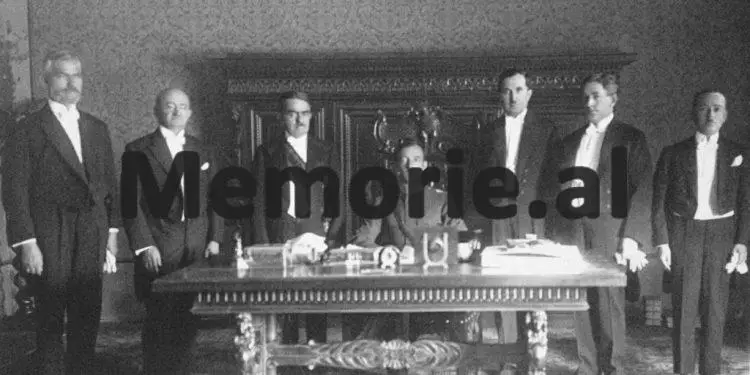

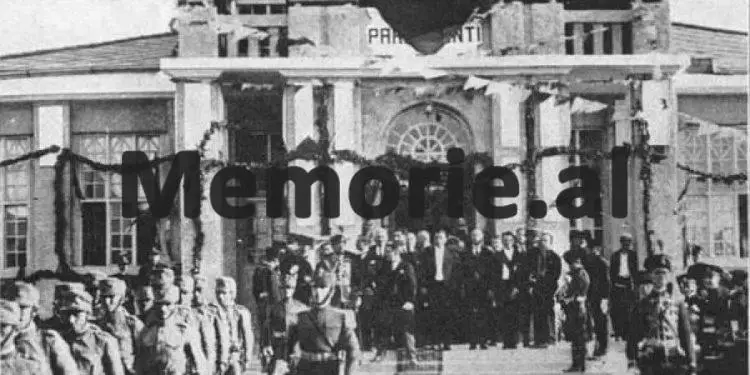
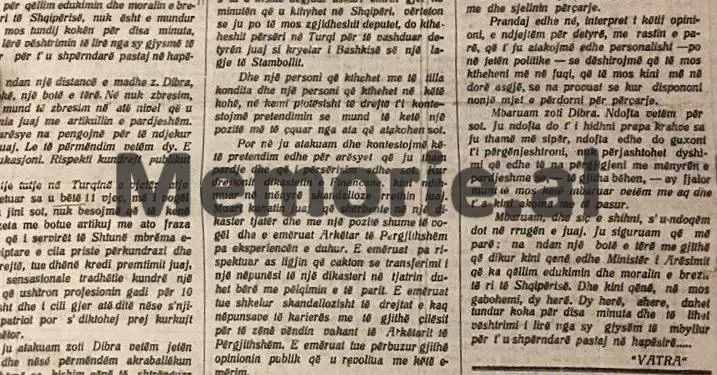
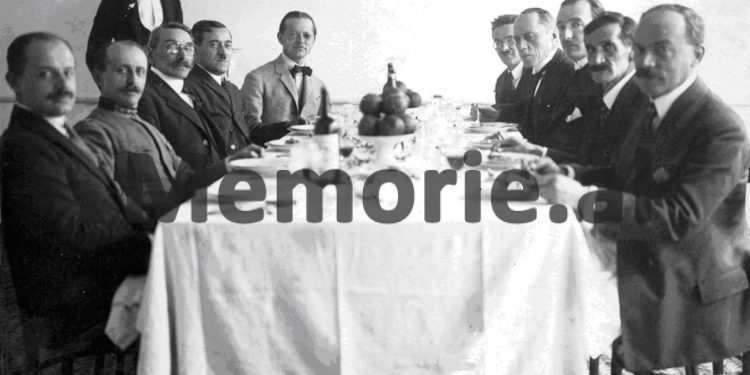
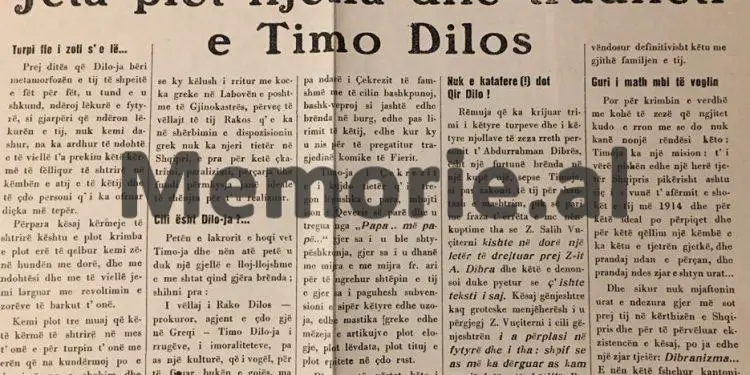
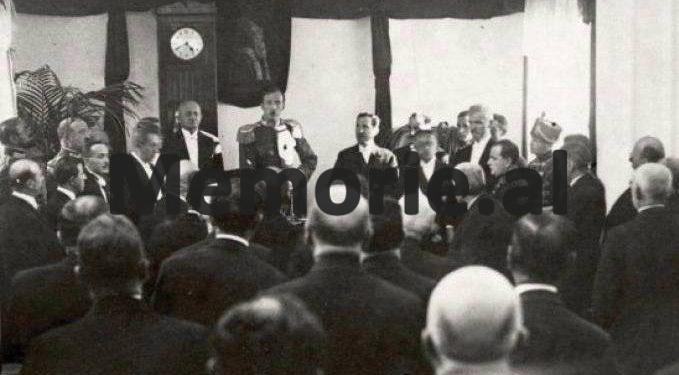
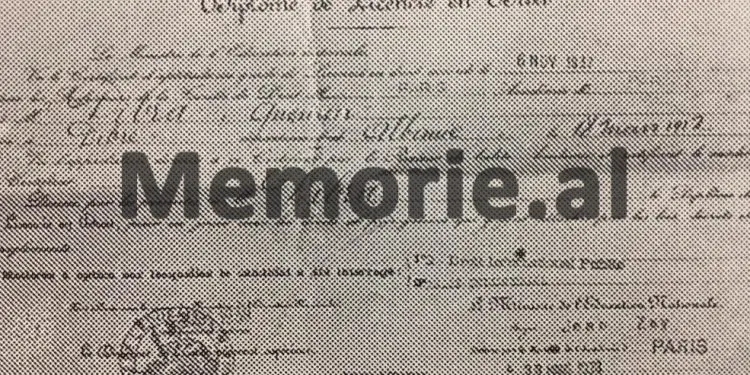
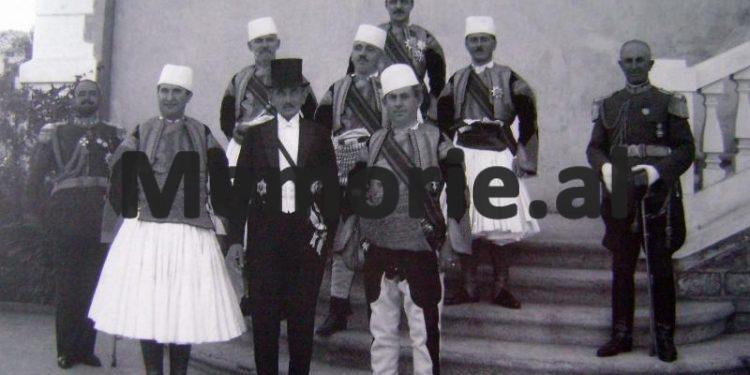
![“In an attempt to rescue one another, 10 workers were poisoned, but besides the brigadier, [another] 6 also died…”/ The secret document of June 11, 1979, is revealed, regarding the deaths of 6 employees at the Metallurgy Plant.](https://memorie.al/wp-content/uploads/2026/02/maxresdefault-350x250.jpg)





